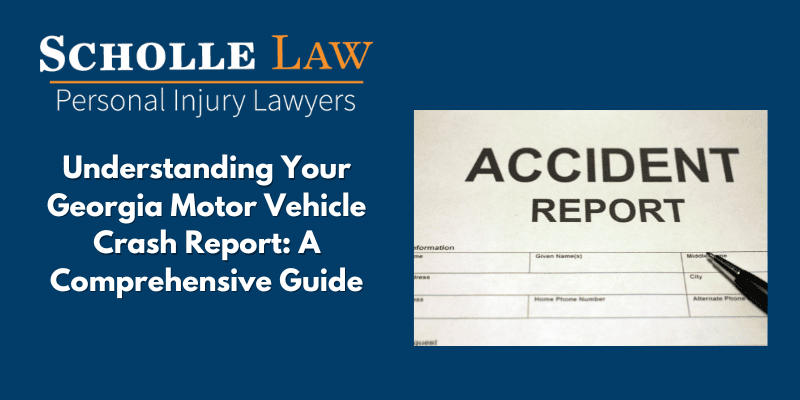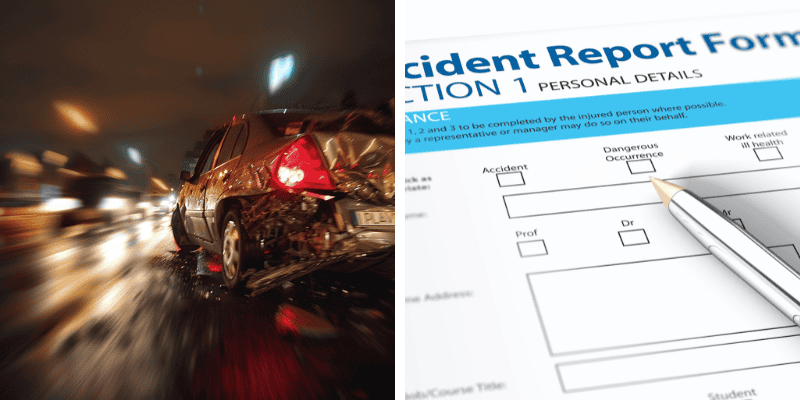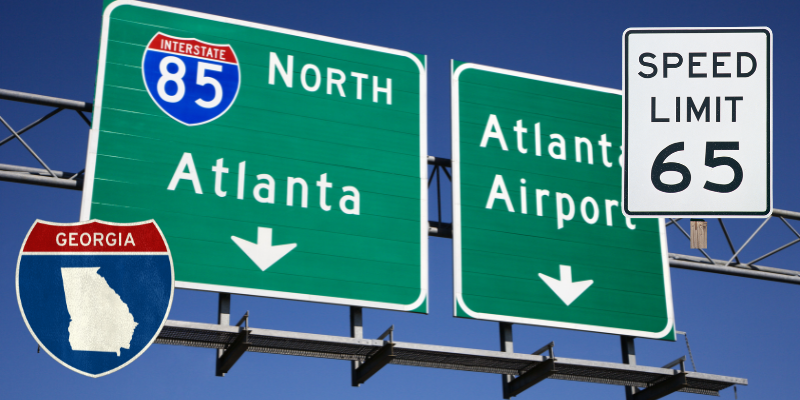4.9 Rating
Google REVIEWS
Leaders in Georgia Personal Injury Law Since 1995
Understanding Your Georgia Motor Vehicle Crash Report: A Comprehensive Guide
Need to nail down the details of your Georgia motor vehicle crash? Your first step is getting the Georgia Motor Vehicle Crash Report. We’ll show you the easiest routes to your report and break down its jargon so you can tackle insurance claims and legal steps with confidence.

Key Takeaways
- Georgia Motor Vehicle Crash Reports are essential documents compiled by police that record the unbiased details of an accident, which are crucial for insurance claims and legal proceedings.
- Crash reports can be obtained through online platforms such as BuyCrash.com, in person at local police departments or State Patrol offices, or with the assistance of a car accident lawyer.
- Understanding the critical information, codes, and notations in a Georgia crash report is key to determining fault and effectively using the report in legal cases and insurance claims.

The Importance of Georgia Motor Vehicle Crash Reports
Visualize your accident report playing a key role in your insurance claim or potential legal case. Compiled by police officers, these reports provide an accurate, unbiased account of the accident. They capture key details such as:
- the date
- time
- location
- vehicle descriptions
- driver information
These reports preserve essential elements of transportation that might otherwise be forgotten in the chaos of a motor vehicle accident.
However, the importance of Georgia accident reports extends beyond mere documentation. These reports provide a comprehensive record of the accident, helping to alleviate anxiety and uncertainty about the incident’s details. With a crash report in hand, you’re one step closer to:
- understanding the circumstances surrounding your accident
- determining fault
- filing an insurance claim
- seeking legal representation if necessary
Moving forward becomes easier when you have all the helpful information at your disposal.
These reports don’t merely contain facts; they also act as a substantial basis for insurance claims and potential legal proceedings. The Georgia Department of Public Safety and the Georgia State Patrol use these documents to compile data on road accidents, contributing to policies and initiatives for safer roads.
One might wonder how to access this essential document. We’ll explain the various methods to acquire your Georgia Motor Vehicle Crash Report.
How to Obtain Your Georgia Motor Vehicle Crash Report
There are three primary ways to get your Georgia accident report: through online services, in-person requests, or with the help of a car accident lawyer. Each method has its merits and can cater to different circumstances.
We’ll now examine these methods in greater depth.
Online Request via BuyCrash.com
Welcome to the age of the internet, where obtaining your accident report can be as simple as a few clicks. BuyCrash.com is an authorized platform for accessing Georgia accident reports online. For a nominal fee of $5, you can order your accident report and have it delivered right to your inbox.
Once ordered, the accident report can be downloaded or emailed as per your preference. This online access offers convenience and speed, allowing you to get a hold of your report without the hassle of visiting an office in person. However, do note that the report will typically be made available online a few days after the incident has been processed by the local authorities.
While this method is convenient, it might not be the best choice for everyone. If you prefer a more traditional approach or need assistance understanding your report, you might want to consider the next option.
In-Person Request at State Patrol or Local Police Office
If you prefer the in-person approach, you can obtain your Georgia accident report by visiting the appropriate local police department, the Georgia State Highway Patrol office, or the Open Records Unit. At the time of the accident, most law enforcement agencies will provide an accident report number, which you can later use to request the report. If you don’t have it, fear not, as the Records Units can typically look up your report using your name, date of birth, and collision date.
Much like obtaining your report online, there is a nominal fee involved when requesting in person, which generally ranges from $5 to $15. You will also need to provide proof of identification, such as a driver’s license or government-issued ID, along with the accident details.
While this method might require more effort than the online approach, it provides an opportunity to ask questions and clarify any confusion about the report on the spot. However, if you need a more thorough understanding and legal advice, considering a free consultation as the last option could be beneficial.
Requesting Assistance from a Car Accident Lawyer
Navigating the aftermath of a car accident can be overwhelming. This is where a car accident lawyer can be of immense help. Not only can they assist you in obtaining your accident report, but they can also provide invaluable insight into its contents and guide you through the complex legal process.
The lawyers at Scholle Law Car & Truck Accident Attorneys, are trained to analyze the codes and information on the crash report, contributing to a confident understanding of the reported accident circumstances. They can determine the most effective way to assist you, which can be particularly valuable if legal action is necessary. In such cases, they provide guidance on filing personal injury claims against involved drivers and the relevant insurance companies.
While this method might seem more formal, it is essential to remember that a car accident lawyer is on your side. Their expertise can be instrumental in securing a fair settlement and ensuring your rights are protected. Now that we’ve covered how to obtain your report, let’s move on to understanding its contents.
Decoding Your Georgia Motor Vehicle Crash Report
Understanding your Georgia crash report might feel like deciphering a foreign language. But don’t fret, we’re here to guide you through it. The report consists of four parts:
- The front
- The back
- The overlay (key to understanding codes and data fields)
- Continuation sheets for added information.
We’ll dissect it further for clarity.
Identifying Critical Information
The first step in decoding your Georgia crash report is identifying the critical information it contains. You’ll find the names, addresses, phone numbers, and insurance details of all drivers involved, along with descriptions of their vehicles. This information is vital for any insurance claims or legal proceedings that may follow the accident.
In addition to driver and vehicle details, the crash report provides important information about the accident conditions. This includes:
- The location at the area of impact
- Potential obstructions to vision
- The maneuvers involved prior to the collision
- Notes if a drug or alcohol test was conducted
Various codes are used to capture collision details, such as:
- The initial point of contact
- The type of collision
- Damage to vehicles
- Injuries sustained by the parties involved
Deciphering these codes can illuminate the accident’s specifics and play a vital role in fault determination.
Lastly, the report employs special codes to categorize age, with specific indications for infants, elderly individuals, and cases where age is unknown. This information can be important in understanding the circumstances of the accident and determining any potential liability.
Understanding Codes and Notations
Having identified the crucial information, let’s now focus on interpreting the codes and notations. The ‘Area of Initial Contact’ indicates where the vehicle was first hit, contributing to accident reconstruction efforts. The ‘Location at Area of Impact’ section specifies the position of the vehicles on the roadway when the impact occurred. Understanding these codes can provide crucial information for personal injury cases.
The ‘Cargo Body Type’ helps determine the type of cargo a vehicle was carrying and the severity of the accident. Misinterpretations of the ‘Light Condition’ codes can lead to incorrect conclusions about the visibility during the accident.
Contributing factors such as speeding, distracted driving, or driving under the influence are listed to establish the cause of the crash. Comparing the reported car speed with the area’s speed limit assists in determining if speeding contributed to the accident.
Injury codes indicate suspected injuries and underscore the significance of timely medical evaluation post-accident. Road condition codes and construction/maintenance work zone indicators highlight environmental and external factors affecting the crash. Understanding these codes and notations can provide a comprehensive picture of the accident, aiding in insurance claims and legal proceedings.
Determining Fault in Georgia Car Accidents
Determining fault is a critical aspect of any car accident case. In Georgia, a party can only recover damages if they are 49 percent or less at fault, and the amount of compensation is reduced by their percentage of fault. In multi-vehicle accidents, fault is assessed by a comprehensive evaluation of each driver’s actions, with adherence to state laws and regulations guiding the determination.
Accident reports serve as crucial legal documents that provide an official account of the event, helping insurance companies and attorneys streamline the claims process and resolve liability disputes. For instance, drug and alcohol test results included in the report can be pivotal in personal injury cases, significantly impacting the determination of fault.
Understanding your crash report is thus crucial in determining fault and navigating the complexities of Georgia’s modified comparative negligence law. You may wonder how to effectively utilize this report in a car accident case. We’ll share some useful tips.

Tips for Using Your Accident Report in a Car Accident Case
In legal proceedings, a Georgia motor vehicle crash report serves as valuable evidence. A car accident lawyer can leverage this to strengthen your case. Having legal representation can position victims more favorably in the negotiation process and potentially lead to higher settlement offers from insurance companies.
Lawyers play a key role in:
- Ensuring that all legal deadlines, such as the statute of limitations, are met
- Navigating insurance coverage
- Confirming that claimants receive the full benefits entitled under their policies.
Insurance companies may attempt to assign a greater percentage of fault to the claimant, and a skilled lawyer can contest such strategies to maintain the integrity of your claim. For severe collisions resulting in injuries, significant property damage, or fatalities, it is critical to hire a car accident lawyer to navigate the complexities of the legal process and deal with the insurance company.
Common Mistakes and Misconceptions About Georgia Accident Reports
As with any official document, misconceptions can arise with Georgia accident reports. For instance, a section indicating fire damage to a vehicle does not necessarily mean the fire was the cause of the accident; it could have occurred post-impact. The use of extrication equipment does not always signify a severe accident; such equipment may be utilized in various collision scenarios.
Additionally, not every accident involving airbag deployment is severe; airbags can also deploy in relatively minor crashes. The total loss of a vehicle is determined by repair costs exceeding its replacement cost, not merely the deployment of airbags.
In Georgia, a driver who hits a non-fixed object like a pedestrian or an animal isn’t automatically at fault, as these non-fixed objects can also share responsibility under certain circumstances. Also, the law enforcement officer’s assessment of injuries or damage in an accident report is not definitive, as they are not medical professionals. Understanding these common mistakes and misconceptions can help you make the most of your accident report.

When to Consult a Georgia Car Accident Lawyer
Interpreting your accident report and traversing the legal landscape can appear intimidating. This is when a Georgia car accident lawyer can prove invaluable. Early consultation with a lawyer can help you understand your accident report, develop a legal strategy, and ensure all valid injuries are accounted for in your personal injury claim.
Lawyers like Scholle Law Car & Truck Accident Attorneys are experienced in:
- Obtaining accident reports
- Litigating car accidents
- Negotiating with insurance companies
- Achieving fair settlements
Their knowledge is crucial for handling car accident cases.
A car accident lawyer can help you in the following ways:
- Demystifying the complexities of the accident report
- Helping you understand and leverage the report’s information towards your personal injury claim
- Ensuring that you’re well-equipped to handle any legal challenges that may arise from your motor vehicle accident
Summary
Navigating the aftermath of a car accident can be challenging, but understanding your Georgia Motor Vehicle Crash Report can make the journey easier. From documenting crucial details about the accident to serving as the foundation for insurance claims and legal cases, these reports are invaluable.
Remember, if you’re involved in a car accident in Georgia, consulting a car accident lawyer early on can make a significant difference. They can help decode your accident report, guide you through the legal process, and ensure you’re adequately compensated for your ordeal. So, stay informed, stay safe, and remember, you’re not alone on this journey.
Frequently Asked Questions
What is a SR 13 form Georgia?
The SR 13 form in Georgia is used to report any accidents involving damage to property or vehicles, and it is important to fill out this form before leaving the accident scene.
Do you have to report a car accident in Georgia?
Yes, in Georgia, you are legally required to report a car accident in most situations, and failing to do so can result in judicial consequences and could impact your ability to recover compensation for damages.
How do I find my accident report online in Georgia?
You can find your accident report online in Georgia through BuyCrash.com, which contracts with the Georgia Department of Transportation to provide access to police crash reports. You can purchase the report directly from the BuyCrash website or request it by mail using the GDOT Request Form.
What important information does a Georgia crash report contain?
A Georgia crash report contains important details like driver and vehicle information, accident conditions, and injury specifics, which are crucial for assessing the situation.
